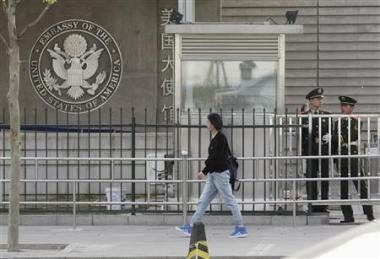Chen Guangcheng: Blind Lawyer Latest In Long Line Of Chinese Civil-Rights Activists

The nighttime escape of Chen Guangcheng after 19 months of house arrest -- and the reported subsequent American protection of the Chinese civil-rights lawyer -- has thrown a wrench into ongoing efforts to build sturdier diplomatic ties among China, the U.S. and the broader world.
But his daring nocturnal flight, which was reportedly aided by a shadowy network of activists and supporters, is just the latest in a decades-long history of thorns in the proverbial side of the China's ruling regime.
Chen made his way to the U.S. embassy in Beijing from his home in Linyi village in Shandong province after his escape from house arrest on April 22, fellow activist Hu Jia told BBC News on Friday.
Hu said that Chen, a blind attorney known as the Barefoot Lawyer, first scaled a high wall and then was driven hundreds of kilometers to Beijing, BBC News reported.
Neither the Chinese nor U.S. governments have confirmed Chen's location on Sunday.
Chen's whereabouts, should he actually be in Beijing's U.S. embassy, carry broader diplomatic implications that could have repurcussions on a looming two-day U.S.-China Strategic and Economic Dialogue scheduled to begin on Thursday in Beijing. Many wonder if the dissident's location and treatment will be a sticking point at the gathering of Obama administration officials and Chinese economic leaders.
Chen won't be the last to stir up international ire over civil rights violations in China. Three of Chen's contemporaries and unofficial brothers in arms, all still alive, have been on Beijing's bad side and lived to tell the tale. But seeing the many-branched tree of civil and human rights activists from which he descended offers an overview of the current state of China's political dissent. As history shows, angering the Chinese government almost always carries a price.
Wang Dan: Life After Tiananmen Square
Student-led protesters called for increased economic reform and liberalization in 1989, as inflation, corruption and a dicey future for the nation's youth had become sticking points throughout the previous decade. The demonstrations ultimately drew military action in Tiananmen Square on June 4, 1989, to stifle the protests. The incident remains arguably the best-known challenge to China's regime in its post-Mao Zedong history.
The life of one of the movement's leaders offers a best-case scenario for Chen Guangcheng. Wang Dan, considered a leader in the 1989 pro-democracy movement, topped the Chinese government's list of 21 fugitives who were sought by the state after the protests.
After a month in hiding, he was arrested and served four years in prison for spreading counter-revolutionary propaganda and incitement. The relatively mild sentence was followed by another 11-year stint in the pen caused by Wang's continued activism after his release.
His prison term was cut short due to medical concerns, according to the Chinese Government, though the timing of Wang's release coincided with the U.S. dropping support for a United Nations Commission on Human Rights resolution lambasting China.
Wang has gone on to earn a Ph.D. from Harvard, as well as teach and host a radio show in Taiwan.
Jigme Gyatso: Tibetan Activism Beyond Self-Immolation
Activists pushing for Tibetan freedom have sometimes garnered headlines via the unfortunate route of public self-immolation. Lama Jigme Gyatso has spent over 15 years paying for leading the clandestine efforts of the Association of Tibetan Freedom Movement in 1988 and 1989 and organizing a rally in Lhasa.
He has spent the better part of the last two decades imprisoned or under surveillance, but has gained notoriety within Tibetan freedom-fighting circles. In 1996, he was arrested and charged with counterrevolutionary activity and ultimately sentenced to 15 years in jail.
His stay in prison was marked by allegedly lengthy interrogations and beatings, according to a 1997 Amnesty International report. The organization has called for the monk's release at various times during his imprisonment, to no avail. He remains in captivity.
Ai Weiwei: Cultural and Political Realms Collide
Arguably the most prominent of China's current generation of activists is artist and activist Ai Weiwei. The 56-year-old has led a curious double-life as an exemplar of China's exceptional cultural prowess while also being a critic of Beijing's policies. The award-winning artist's collaboration with Swiss architects Herzog & de Meuron produced the lauded, grandiose Olympic National Stadium, which became the iconic symbol of the 2008 Olympics. Yet he has also investigated cover-ups and corruption within the regime.
The outspoken Ai has demanded democracy, supported Nobel Peace Prize-winner and political prisoner Liu Xiaobo, and alleged that government corruption played a role in the deaths of schoolchildren in the Sichuan earthquake in 2008, according to the New York Times. The price he's had to pay to date, however, is mild by comparison to that of his predecessors.
His studio was demolished in January 2011, and Ai was detained by Chinese officials in April while trying to board a plane for Hong Kong. He remained in captivity for three months before being released in June. It was considered one of China's rarer moments of bowing to outside pressure against human rights violations.
Beijing has since saddled Ai with a $2.4 million bill for the alleged evasion of tax payment from a design company owned by the artist's wife.
© Copyright IBTimes 2024. All rights reserved.




















